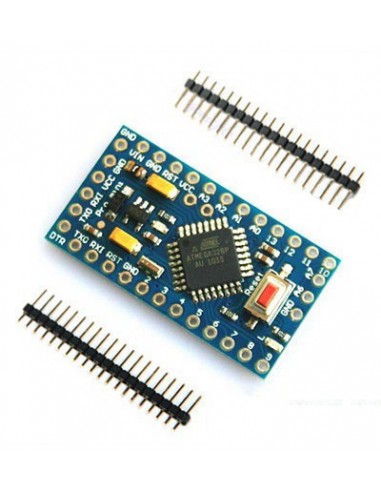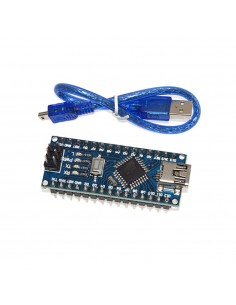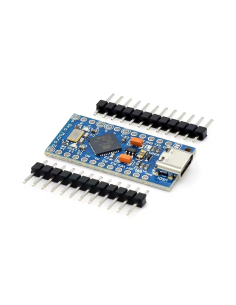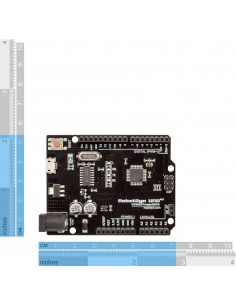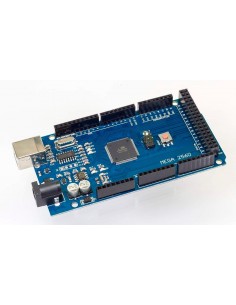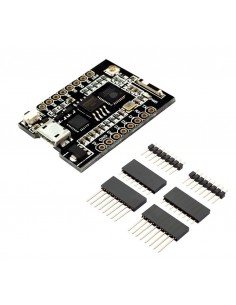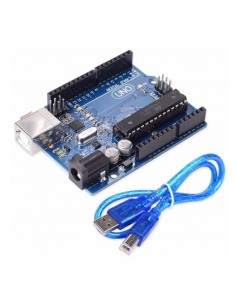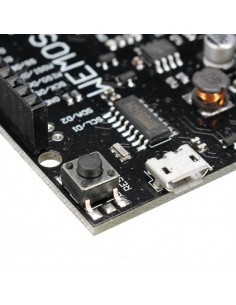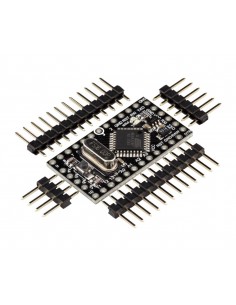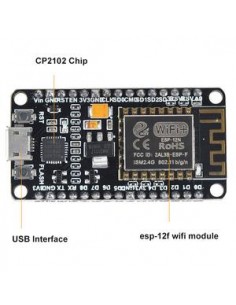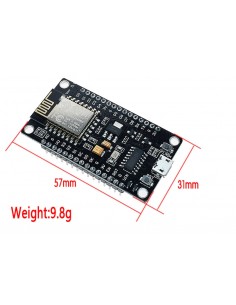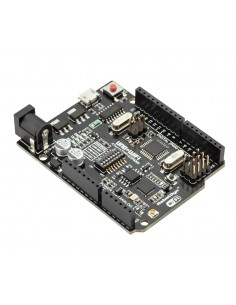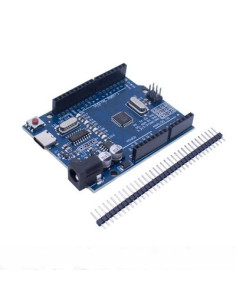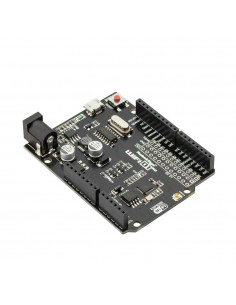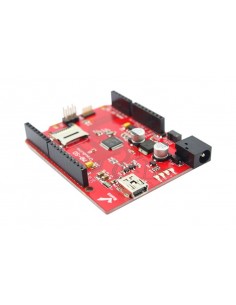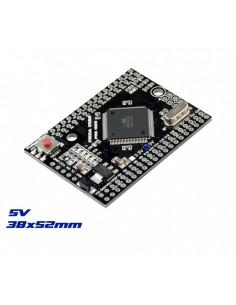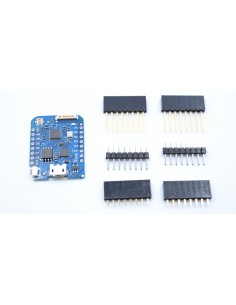ProMini 328
Mini ATmega328 (128) / 16 МГц / Flash ROM 16 кБ / 5V
Overview
Arduino Pro Mini microcontroller built Mini ATmega328 (ATmega128). It has 14 digital inputs and outputs (of which 6 can be used as PWM outputs), 6 analog inputs, a resonator, a reset button, and holes for mounting pin. A six pins can be connected to the cable or FTDI board Sparkfun converter to provide power and communication via USB.
Arduino Pro Mini is designed for non-permanent installation in objects or artifacts. The board comes without pre-mounted headers, allowing users to apply their own conclusions and connectors. Pinout compatible with the platform Arduino Mini.
Food
Arduino Pro Mini can be powered: via cable FTDI, or on-board converter, or from a regulated power supply 5 V via pin Vcc, or from an unregulated source via terminal RAW.
Power terminals:
- RAW . To connect an unregulated voltage.
- VCC . To connect the regulated 5V
- GND. Conclusions ground.
Memory
Mini ATmega328 microcontroller has 16 KB of flash memory for storing code (of which 2 KB used for the bootloader), 1 KB of SRAM and 512 bytes of EEPROM (which can be read and written using the EEPROM library ).
Inputs and Outputs
Each of the 14 digital pins on the Pro, using the function pinMode () , digitalWrite () , and digitalRead () , can be configured as input or output. They operate at a voltage of 3.3 V. Each pin has a pull-up resistor (disconnected by default) of 20-50 kOhms and can source up to 40 mA. Some pins have specialized functions:
- Serial Bus: 0 (RX) and 1 (TX) . Used to receive (RX) and transmit (TX) data TTL. These findings have a connection with the conclusions of the TX-0 and RX-1 block of six conclusions.
- External Interrupt 2 and 3 . These pins can be configured to trigger an interrupt on a low value, a rising or falling edge, or when the value changes. Detailed information can be found in the function description attachInterrupt ().
- PWM: 3, 5, 6, 9, 10, and 11 . Any of the findings provides PWM 8-bit resolution by using the analogWrite () .
- SPI: 10 (SS), 11 (MOSI), 12 (MISO), 13 (SCK) . These pins Feedback SPI, which, although provided by the underlying hardware, is not included in the language of Arduino.
- LED: 13 . Built-in LED connected to digital pin 13. If the value on the output is held high, the LED lights.
Platform Pro Mini has 6 analog inputs, each 10 bits of resolution (ie 1024 different values). Four of these are located at the edge of the platform and the other two (inputs 4 and 5) closer to the center. Measurement is from ground to VCC. Some conclusions have additional features:
- I2C: 4 (SDA) and 5 (SCL) . Communicates findings through I2C (TWI), which is used to create a library Wire.
There is an additional output on the platform:
- Reset . Low level signal at pin resets the microcontroller. Typically used to connect the reset button on the expansion card, closing access to the button on the board Arduino.
Note the connection between Arduino pins and ATmega168 ports .
Link
Platform Arduino Pro Mini has multiple devices for communicating with a computer, another Arduino, or mikrokontrollerami.ATmega168 supports serial UART TTL, digital pins 0 (RX) and 1 (TX). Monitoring serial bus (Serial Monitor) program Arduino allows you to send and receive text data connection via USB.
SoftwareSerial library allows for serial communication on any of the digital outputs Pro Mini.
Programming
Programmed via software platform Arduino. Detailed information is in the directory and instructions.
Mini ATmega328 microcontroller comes with a recorded loader, facilitating entry of new programs without the use of an external hardware programmer. Communication takes the original protocol STK500.
You can also bypass the bootloader and program Mini ATmega328 using an external programmer. Detailed information can be found in this manual.
Automatic (Software) Reset
Arduino Pro Mini is designed in such a way that before writing new code implemented restart the program itself rather than by pressing buttons on the platform. One of the conclusions on the block of six pins is connected to the reset line Mini ATmega328 microcontroller via a 100 nF. This pin is connected to one of the lines of flow control converter USB-to-serial, connected to the unit: RTS lines to using FTDI cable or DTR line when you use the converter-Sparkfun. Activation of this line is supply low-level signal, resets the microcontroller. Program Arduino, using this function to upload code by pressing the Upload in the Arduino environment. Submission of low-level signal to the reset line coordinated with the start of writing code that reduces the loader timeout.
Function has another application. Reboot Pro Mini happens every time you connect to the Arduino program on a computer running Mac X or Linux (via USB). The following half-second after reboot bootloader works. During programming intercept the first few bytes of code to avoid making incorrect data platform (all except the code of the new program). If you are debugging single sketch recorded in the platform configuration or other data when it first starts, make sure that the program on the computer waits a second before transmitting data.
Physical characteristics
Dimensions PCB Pro Mini of 1.8 x3, 3 cm
- Microcontroller:
- Mini ATMEGA328
- Operating Voltage:
- 5V
- DC Current per I/O Pin:
- 40 mA
- Digital I/O Pins:
- 14
- PWM:
- 6
- Analog Input Pins:
- 6
- Flash Memory:
- 16 KB
- SRAM:
- 1 KB
- Bootloader:
- 2 KB
- EEPROM:
- 512 B
- Clock Speed:
- 16 MHz
- USB cable:
- Not in a complete set
- Size:
- 1,8х3,3 см.
- Brand:
- Funduino


